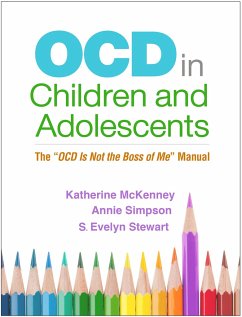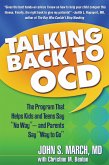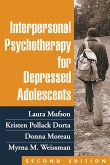Katherine McKenney (University of British Columbia, Cornerstone Chi, Annie Simpson (British Columbia, Cornerstone Child and Family Psych, S. Evelyn Stewart (University of British Columbia, BC Children's Ho
Ocd in Children and Adolescents
The Ocd Is Not the Boss of Me Manual
Katherine McKenney (University of British Columbia, Cornerstone Chi, Annie Simpson (British Columbia, Cornerstone Child and Family Psych, S. Evelyn Stewart (University of British Columbia, BC Children's Ho
Ocd in Children and Adolescents
The Ocd Is Not the Boss of Me Manual
- Broschiertes Buch
- Merkliste
- Auf die Merkliste
- Bewerten Bewerten
- Teilen
- Produkt teilen
- Produkterinnerung
- Produkterinnerung
In a large-size format for easy photocopying, this user-friendly manual presents a tested treatment protocol for children and adolescents (ages 6 to 18) struggling with obsessiveâ compulsive disorder (OCD).
Andere Kunden interessierten sich auch für
![Evidence-Based Psychotherapies for Children and Adolescents Evidence-Based Psychotherapies for Children and Adolescents]() Evidence-Based Psychotherapies for Children and Adolescents104,99 €
Evidence-Based Psychotherapies for Children and Adolescents104,99 €![Talking Back to Ocd Talking Back to Ocd]() John S. MarchTalking Back to Ocd26,99 €
John S. MarchTalking Back to Ocd26,99 €![Interpersonal Psychotherapy for Depressed Adolescents Interpersonal Psychotherapy for Depressed Adolescents]() Laura H. Mufson (Columbia University Medical Center and New York StInterpersonal Psychotherapy for Depressed Adolescents49,99 €
Laura H. Mufson (Columbia University Medical Center and New York StInterpersonal Psychotherapy for Depressed Adolescents49,99 €![Children and Grief Children and Grief]() J. William Worden (Harvard Medical School and Massachusetts GeneralChildren and Grief52,99 €
J. William Worden (Harvard Medical School and Massachusetts GeneralChildren and Grief52,99 €![Trauma-Focused CBT for Children and Adolescents Trauma-Focused CBT for Children and Adolescents]() Trauma-Focused CBT for Children and Adolescents47,99 €
Trauma-Focused CBT for Children and Adolescents47,99 €![Multisystemic Therapy for Antisocial Behavior in Children and Adolescents Multisystemic Therapy for Antisocial Behavior in Children and Adolescents]() Scott W. Henggeler (Department of Psychiatry and Behavioral ScienceMultisystemic Therapy for Antisocial Behavior in Children and Adolescents64,99 €
Scott W. Henggeler (Department of Psychiatry and Behavioral ScienceMultisystemic Therapy for Antisocial Behavior in Children and Adolescents64,99 €![Treating Trauma and Traumatic Grief in Children and Adolescents Treating Trauma and Traumatic Grief in Children and Adolescents]() Judith A. CohenTreating Trauma and Traumatic Grief in Children and Adolescents65,99 €
Judith A. CohenTreating Trauma and Traumatic Grief in Children and Adolescents65,99 €-
-
-
In a large-size format for easy photocopying, this user-friendly manual presents a tested treatment protocol for children and adolescents (ages 6 to 18) struggling with obsessiveâ compulsive disorder (OCD).
Hinweis: Dieser Artikel kann nur an eine deutsche Lieferadresse ausgeliefert werden.
Hinweis: Dieser Artikel kann nur an eine deutsche Lieferadresse ausgeliefert werden.
Produktdetails
- Produktdetails
- Verlag: Guilford Publications
- Seitenzahl: 252
- Erscheinungstermin: 6. Februar 2020
- Englisch
- Abmessung: 264mm x 203mm x 23mm
- Gewicht: 680g
- ISBN-13: 9781462542031
- ISBN-10: 1462542034
- Artikelnr.: 57163844
- Herstellerkennzeichnung
- Libri GmbH
- Europaallee 1
- 36244 Bad Hersfeld
- gpsr@libri.de
- Verlag: Guilford Publications
- Seitenzahl: 252
- Erscheinungstermin: 6. Februar 2020
- Englisch
- Abmessung: 264mm x 203mm x 23mm
- Gewicht: 680g
- ISBN-13: 9781462542031
- ISBN-10: 1462542034
- Artikelnr.: 57163844
- Herstellerkennzeichnung
- Libri GmbH
- Europaallee 1
- 36244 Bad Hersfeld
- gpsr@libri.de
Katherine McKenney, PhD, is a staff psychologist with the Provincial OCD Program at BC Children's Hospital (BCCH) in Vancouver, British Columbia, Canada, as well as Adjunct Professor in the Department of Psychology at the University of British Columbia and a director at Cornerstone Child and Family Psychology Clinic. At BCCH, Dr. McKenney provides assessment and group treatment to youth with obsessive-compulsive disorder (OCD) and their families. She also consults and trains clinicians around the province, is actively involved in research and program development, and has coauthored numerous peer-reviewed publications. Dr. McKenney has developed several group therapy manuals for the treatment of OCD and maintains a busy private practice. Annie Simpson, PhD, is a director at Cornerstone Child and Family Psychology Clinic in Vancouver and a clinical associate in the Department of Psychology at Simon Fraser University in Burnaby, British Columbia, Canada. She previously worked as a staff psychologist with the Provincial OCD Program at BC Children's Hospital (BCCH). Dr. Simpson was actively involved in research and program development in her role at BCCH and coauthored numerous publications. She has worked as a consultant for Anxiety Canada, providing lectures and workshops and developing self-help materials for children and adolescents. S. Evelyn Stewart, MD, is Full Professor in the Department of Psychiatry at the University of British Columbia, in Vancouver, Canada, and Founding Director of the Provincial OCD Program at BC Children's Hospital (BCCH), the first integrated clinic and research program for pediatric OCD in Canada. Dr. Stewart spent her early career as a psychiatrist within the pediatric and adult obsessive-compulsive disorder (OCD) clinic teams at Massachusetts General Hospital, as Research Director of the OCD Institute at McLean Hospital, and as Assistant Professor at Harvard Medical School. She has authored over 100 original papers, reviews, and book chapters on family, genetic, neuroimaging, and treatment aspects of OCD and related illnesses throughout the lifespan.
I. Preparing to Initiate ERP Exposure and Response Prevention
1. An Overview of Pediatric Obsessive-Compulsive Disorder and Its Treatment
2. ERP Preparation and Delivery
3. Fine-Tuning ERP Delivery
4. Complementary Approaches to ERP
II. Providing Treatment: 10 Nuts-and-Bolts Modules
- Module 1. Treatment Preparation with the Child or Youth and Their Parents
- Module 2. Explaining ERPs, Building an OCD Ladder, and Implementing
Rewards
- Module 3. Foundational Treatment Tools: Breaking Free of OCD's Traps,
Bossing Back OCD, and Identifying Family Accommodation
- Module 4. Breaking OCD's Rules: The Four S's, Exposure Games, and
Limiting Family Accommodation and Reassurance Seeking
- Module 5. Tools to Help with OCD "Bad Thoughts": Imaginal Exposures and
Dealing with OCD-Related Rage
- Module 6. Tools to Help with ERPs: Coping Cards, Floating On By, Coping
with Doubt Scripts, and Reducing Stigma
- Module 7. Troubleshooting ERPs: Suboptimal Response, Therapist Pitfalls,
and Barriers to Treatment Success
- Module 8. Self- and Family Care: Boosting Self-Esteem, Attending to
Personal Needs, and Managing OCD in Schools
- Module 9. Preparing for the Future: Relapse Prevention and Consolidating
Gains
- Module 10. Graduation: Celebration and Maintenance of Gains
References
Index
1. An Overview of Pediatric Obsessive-Compulsive Disorder and Its Treatment
2. ERP Preparation and Delivery
3. Fine-Tuning ERP Delivery
4. Complementary Approaches to ERP
II. Providing Treatment: 10 Nuts-and-Bolts Modules
- Module 1. Treatment Preparation with the Child or Youth and Their Parents
- Module 2. Explaining ERPs, Building an OCD Ladder, and Implementing
Rewards
- Module 3. Foundational Treatment Tools: Breaking Free of OCD's Traps,
Bossing Back OCD, and Identifying Family Accommodation
- Module 4. Breaking OCD's Rules: The Four S's, Exposure Games, and
Limiting Family Accommodation and Reassurance Seeking
- Module 5. Tools to Help with OCD "Bad Thoughts": Imaginal Exposures and
Dealing with OCD-Related Rage
- Module 6. Tools to Help with ERPs: Coping Cards, Floating On By, Coping
with Doubt Scripts, and Reducing Stigma
- Module 7. Troubleshooting ERPs: Suboptimal Response, Therapist Pitfalls,
and Barriers to Treatment Success
- Module 8. Self- and Family Care: Boosting Self-Esteem, Attending to
Personal Needs, and Managing OCD in Schools
- Module 9. Preparing for the Future: Relapse Prevention and Consolidating
Gains
- Module 10. Graduation: Celebration and Maintenance of Gains
References
Index
I. Preparing to Initiate ERP Exposure and Response Prevention
1. An Overview of Pediatric Obsessive-Compulsive Disorder and Its Treatment
2. ERP Preparation and Delivery
3. Fine-Tuning ERP Delivery
4. Complementary Approaches to ERP
II. Providing Treatment: 10 Nuts-and-Bolts Modules
- Module 1. Treatment Preparation with the Child or Youth and Their Parents
- Module 2. Explaining ERPs, Building an OCD Ladder, and Implementing
Rewards
- Module 3. Foundational Treatment Tools: Breaking Free of OCD's Traps,
Bossing Back OCD, and Identifying Family Accommodation
- Module 4. Breaking OCD's Rules: The Four S's, Exposure Games, and
Limiting Family Accommodation and Reassurance Seeking
- Module 5. Tools to Help with OCD "Bad Thoughts": Imaginal Exposures and
Dealing with OCD-Related Rage
- Module 6. Tools to Help with ERPs: Coping Cards, Floating On By, Coping
with Doubt Scripts, and Reducing Stigma
- Module 7. Troubleshooting ERPs: Suboptimal Response, Therapist Pitfalls,
and Barriers to Treatment Success
- Module 8. Self- and Family Care: Boosting Self-Esteem, Attending to
Personal Needs, and Managing OCD in Schools
- Module 9. Preparing for the Future: Relapse Prevention and Consolidating
Gains
- Module 10. Graduation: Celebration and Maintenance of Gains
References
Index
1. An Overview of Pediatric Obsessive-Compulsive Disorder and Its Treatment
2. ERP Preparation and Delivery
3. Fine-Tuning ERP Delivery
4. Complementary Approaches to ERP
II. Providing Treatment: 10 Nuts-and-Bolts Modules
- Module 1. Treatment Preparation with the Child or Youth and Their Parents
- Module 2. Explaining ERPs, Building an OCD Ladder, and Implementing
Rewards
- Module 3. Foundational Treatment Tools: Breaking Free of OCD's Traps,
Bossing Back OCD, and Identifying Family Accommodation
- Module 4. Breaking OCD's Rules: The Four S's, Exposure Games, and
Limiting Family Accommodation and Reassurance Seeking
- Module 5. Tools to Help with OCD "Bad Thoughts": Imaginal Exposures and
Dealing with OCD-Related Rage
- Module 6. Tools to Help with ERPs: Coping Cards, Floating On By, Coping
with Doubt Scripts, and Reducing Stigma
- Module 7. Troubleshooting ERPs: Suboptimal Response, Therapist Pitfalls,
and Barriers to Treatment Success
- Module 8. Self- and Family Care: Boosting Self-Esteem, Attending to
Personal Needs, and Managing OCD in Schools
- Module 9. Preparing for the Future: Relapse Prevention and Consolidating
Gains
- Module 10. Graduation: Celebration and Maintenance of Gains
References
Index








